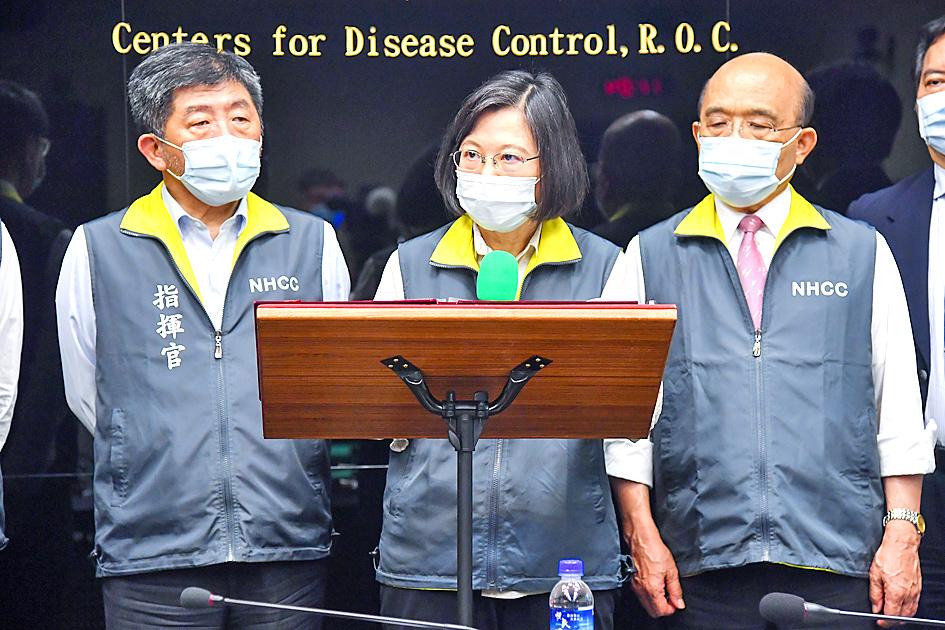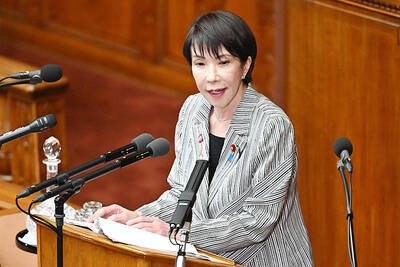President Tsai Ing-wen’s (蔡英文) public approval rating has dropped to a 21-month low following power outages and an increase in locally transmitted COVID-19 infections, a survey showed yesterday.
The Taiwanese Public Opinion Foundation commissioned Focus Survey Research to conduct the survey, which was done by telephone from Monday to Thursday last week.
Tsai’s approval rating dropped to 45.7 percent, the lowest it has been in 21 months, foundation chairman Michael You (游盈隆) said.

Photo: CNA
Premier Su Tseng-chang’s (蘇貞昌) approval rating dropped by 9.5 percent from a survey conducted last month, You said.
“After so many months of favorable governance, the Tsai administration’s ability to run the country is being put to the test,” he said.
The survey asked respondents whether they approved of Tsai’s policies and handling of major issues, to which 8.5 percent said they strongly approved, 37.2 percent approved, 24.9 percent said they did not really approve and 16.4 percent did not approve at all, while 13.1 percent refrained from answering.
The results showed an 8.7 percent decrease in Tsai’s approval rating from a similar poll last month and an 11.4 percent increase in those expressing disapproval of her performance, You said, adding that such a large change in such a short time was rare.
Power outages on May 13 and Monday last week, an increase in local COVID-19 infections and allegations of gang affiliations brought against Democratic Progressive Party members were likely the cause of the approval-rating change, he said, adding that improvements in Taiwan-US relations were insufficient to offset the negative factors.
The survey also asked respondents how satisfied they were with Su’s performance, to which 7.7 percent said they were very satisfied, 37.2 percent were satisfied, 24.7 percent were not really satisfied and 19.9 percent were not satisfied at all, while 10.5 refrained from answering.
“This shows an almost even divide between those satisfied with Su and those not satisfied,” You said. “It’s a complete lack of consensus — and a first for a premier’s approval rating.”
The results showed that 11.5 percent more people expressed disapproval of the premier compared with last month, he said.
The poll collected 1,082 valid samples and has a margin of error of 2.98 percentage points.

The Central Weather Administration (CWA) yesterday said it expected to issue a sea warning for Typhoon Fung-Wong tomorrow, which it said would possibly make landfall near central Taiwan. As of 2am yesterday, Fung-Wong was about 1,760km southeast of Oluanpi (鵝鑾鼻), Taiwan’s southernmost point, moving west-northwest at 26kph. It is forecast to reach Luzon in the northern Philippines by tomorrow, the CWA said. After entering the South China Sea, Typhoon Fung-Wong is likely to turn northward toward Taiwan, CWA forecaster Chang Chun-yao (張峻堯) said, adding that it would likely make landfall near central Taiwan. The CWA expects to issue a land

Taiwan’s exports soared to an all-time high of US$61.8 billion last month, surging 49.7 percent from a year earlier, as the global frenzy for artificial intelligence (AI) applications and new consumer electronics powered shipments of high-tech goods, the Ministry of Finance said yesterday. It was the first time exports had exceeded the US$60 billion mark, fueled by the global boom in AI development that has significantly boosted Taiwanese companies across the international supply chain, Department of Statistics Director-General Beatrice Tsai (蔡美娜) told a media briefing. “There is a consensus among major AI players that the upcycle is still in its early stage,”

The Central Weather Administration (CWA) yesterday said it is expected to issue a sea warning for Typhoon Fung-wong this afternoon and a land warning tomorrow. As of 1pm, the storm was about 1,070km southeast of Oluanpi (鵝鑾鼻), Taiwan’s southernmost point, and was moving west-northwest at 28 to 32kph, according to CWA data. The storm had a radius of 250km, with maximum sustained winds of 173kph and gusts reaching 209kph, the CWA added. The storm is forecast to pass near Luzon in the Philippines before entering the South China Sea and potentially turning northward toward Taiwan, the CWA said. CWA forecaster Chang Chun-yao (張峻堯) said

Japanese Prime Minister Sanae Takaichi yesterday said that China using armed force against Taiwan could constitute a "survival-threatening situation" for Japan, allowing the country to mobilize the Japanese armed forces under its security laws. Takaichi made the remarks during a parliamentary session while responding to a question about whether a "Taiwan contingency" involving a Chinese naval blockade would qualify as a "survival-threatening situation" for Japan, according to a report by Japan’s Asahi Shimbun. "If warships are used and other armed actions are involved, I believe this could constitute a survival-threatening situation," Takaichi was quoted as saying in the report. Under Japan’s security legislation,